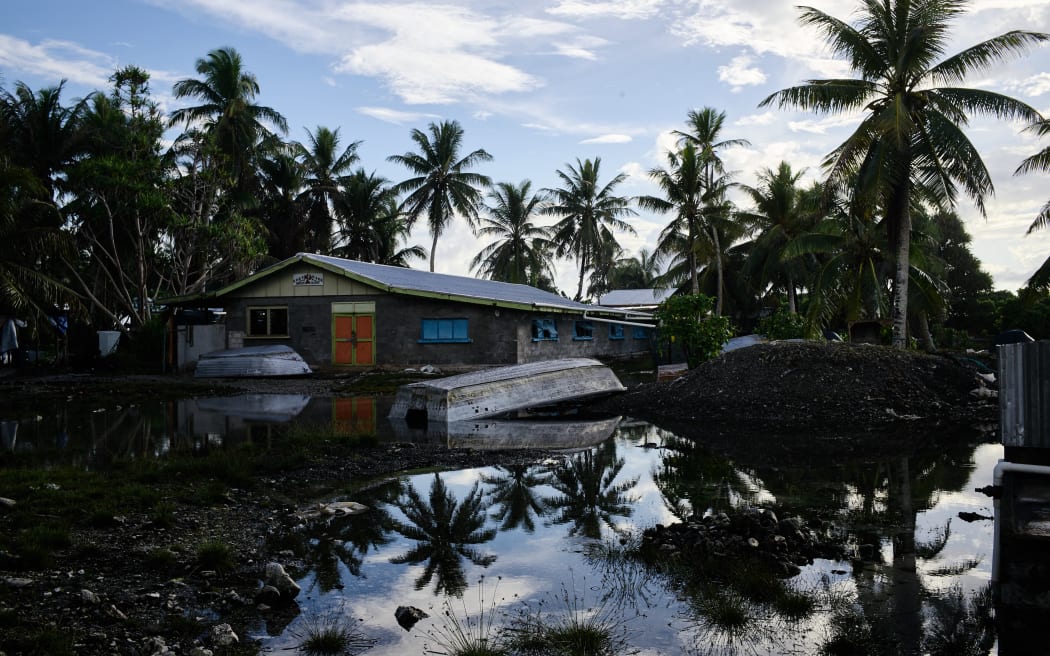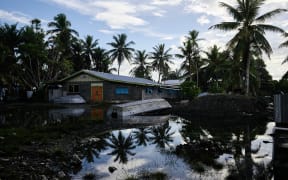By ABC foreign affairs reporter Stephen Dziedzic in Rarotonga and the Pacific Local Journalism Network's Nick Sas

Photo: AFP / Theo Rouby
Australian Prime Minister Anthony Albanese has announced a new pact with Tuvalu, allowing residents facing displacement from climate change the ability to resettle in Australia.
In a move which could transform Australia's relationships with other small Pacific nations and the region as a whole, Albanese announced the agreement at the Pacific Islands Forum in Cook Islands, flanked by Tuvalu's Prime Minister Kausea Natano.
The agreement will see 280 people per year given a "special mobility pathway" to "live, work and study" in Australia.
In return, Australia will have effective veto power over Tuvalu's security arrangements with any other country.
"With the Pacific the best place to support the Pacific's own security, Australia and Tuvalu will also mutually agree cooperation with other countries in Tuvalu's security sectors," the agreement reads.
The agreement comes as Tuvalu's viability is threatened by rising sea levels as climate change escalates.
"As a low-lying nation it is particularly impacted by climate change," Albanese said at a press conference on Friday.
"Its very existence is threatened. I believe developed nations have a responsibility to provide assistance and that is precisely what we are doing.
"[This is] the most significant agreement between Australia and a Pacific island nation ever."
Natano described the deal as a "beacon of hope".
"It's not just a milestone but a giant leap forward in our joint mission to ensure regional stability, sustainability and prosperity," he said.
It is the first time that a Pacific Island nation has agreed to such an intimate relationship with Australia - and the first time that Australia has offered residence or citizenship rights to foreign nationals because of the threat posed by climate change.
Anna Powles, a Pacific expert and senior lecturer in defence and security at Massey University, told the ABC the agreement happened "at speed and under immense secrecy".
"It is hugely significant," she said.
"It comes at a time when the sentiment for self-determination - and Pacific-led priorities and agendas - is at an all time high [and] this agreement would appear to be counter to some of these sentiments."
She said the treaty would provide a model that some countries, such as Nauru and Kiribati, may be encouraged to consider.
"However, it does not create a pathway for other [larger Pacific] countries."
Albanese and Natano met earlier this week on the sidelines of the Pacific Islands Forum where they discussed Tuvalu's plan to adapt to climate change - but neither country flagged this agreement after that meeting.
There are already several independent Pacific states that have associations or "compacts" with larger outside countries.
Palau, the Federated States of Micronesia and the Republic of Marshall Islands all have a Compact of Free Association with the United States, giving Washington authority over their defence issues in return for US government services and the right to live in the US.
Similarly, New Zealand has arrangements with Niue and Cook Islands, which gives Wellington responsibility for their defence.
- This story was first published by ABC.



